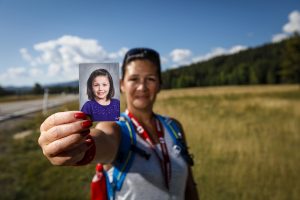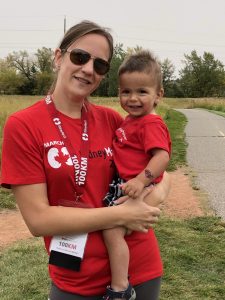Why these moms are walking 100 kilometres for their kids
Kidney March is not your average walkathon. It is the largest walk of its kind in the world fighting against kidney disease and for organ donation. Danielle Sinclair, Laura McKenzie, and Kim Ball are three of the many moms who take part every year. For them, kidney disease is a lifelong battle they never imagined they would have to face.
There is no age limit to kidney disease and kids with kidney disease experience unique challenges that impact the whole family. Danielle Sinclair is marching for her 10-year-old daughter, Teagan. Teagan has a rare kidney disease called Cystinuria that almost went undetected. She was diagnosed at five years old and has had six surgeries to remove large cystine kidney stones. Due to her disease, Teagan lost her right kidney. Danielle’s hope is that Teagan will not need a transplant in her lifetime.
“If my daughter and all the other people on dialysis and with kidney transplants can go through these challenges, I can challenge myself to complete 100 kilometres,” said Sinclair. By raising funds for research and walking the 100 kilometres, Sinclair said she’s able to take an active role in creating change and finding a cure. She hopes that her participation also inspires people to become organ donors.
This past year has been especially hard for first-time Marcher, Laura McKenzie who is facing the new diagnosis of her four-month-old daughter. Laura had to go through a lot of this alone. Due to COVID19 protocols, only one parent was allowed at appointments. “You try to stay strong but … there is only so much a mother can do on her own without breaking down.” Until Laura decided to do Kidney March and share her story, she hadn’t told family and friends. “No one can really do anything for you… but with Kidney March, they now have a way to help and a way to support us.”
“There is just so much love and support in the community and it’s comforting to know that I am not alone,” McKenzie said.
One of the greatest things about Kidney March is it reinforces the support of the community for patients, families, and healthcare professionals. Everyone can rally around the same cause, support each others journey, and connect from their shared experience.
“Being part of the Kidney March family really gives me a sense of belonging,” explains Kim Ball, Calgary urologist and mother of three. Kim’s two-year-old son Liam’s kidneys have failed, he is on dialysis every night and needs a transplant. “As a mom, we want the best outcomes for our kids, we don’t want to see them suffer. So having this opportunity to hopefully better his future means a lot.” Liam’s father is just starting the process of testing through the donor program as he is the best potential match for Liam. They are hoping Liam will be big enough soon so he can receive a living kidney donation by the end of this year.
Dr. Julian Midgley, former chief of pediatric nephrology at the Alberta Children’s Hospital in Calgary, participates alongside many health-care workers in the unit to show support for their patients and raise awareness in the community.
“We get to know these patients very well and this is another point of contact and support for them,” he said. “I’m very proud how the Kidney March has become a bigger and bigger event every year.”
“Every year, we fund incredible research projects, that improve the treatments of kidney disease and bring us that much closer to a cure,” explains Joyce Van Deurzen, Executive Director at The Kidney Foundation of Canada Southern Alberta Branch. “There have been many advances made by our researchers, and Kidney March is a big part of that.”
1 in 10 Canadians has kidney disease. There are also very few warning signs. Up to 80% of kidney function can be lost without any noticeable symptoms. Genetics can cause chronic kidney disease and kidney failure, especially in children and adolescents. Some of these diseases can be rare or even ultra-rare, and a lot is still unknown about them. These moms are marching so that more research can be done to find answers to those unknowns. Not only for their own little ones, but for future families.
- Read More in the Calgary Herald at ‘So much love and Support’: Kidney March taking place virtually again this year to raise funds for kidney research
- Watch the news story on Global News Hour at 6 Calgary: May 9 at 13:22


